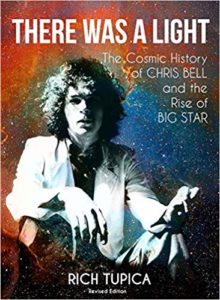 #1 Record never had a chance, and neither did Big Star. As chronicled in author Rich Tupica’s deep dive There Was a Light: The Cosmic History of Chris Bell and the Rise of Big Star, Bell was a studio perfectionist who obsessed over every little sonic detail, tinkering constantly with the revered Memphis pop-rock revelators’ gloriously pristine 1972 debut practically right up until its release. In his eyes, it was as flawless as could be, a work of breathtaking beauty.
#1 Record never had a chance, and neither did Big Star. As chronicled in author Rich Tupica’s deep dive There Was a Light: The Cosmic History of Chris Bell and the Rise of Big Star, Bell was a studio perfectionist who obsessed over every little sonic detail, tinkering constantly with the revered Memphis pop-rock revelators’ gloriously pristine 1972 debut practically right up until its release. In his eyes, it was as flawless as could be, a work of breathtaking beauty.
Done in by a sham of a distribution deal, #1 Record and its sweeping ballads, swooning harmonies and big, bittersweet melodies died on the vine, breaking poor Chris Bell’s heart. Vigorous marketing efforts failed, yielding mountains of fawning reviews and a fair amount of radio airplay, but almost nonexistent sales. Bell’s frustrations boiled over, leading to violent outbursts, intensifying depression and addictions and his abrupt exit from Big Star. In the aftermath, the band—sans Bell, with Chilton assuming control—finished the power-pop classic Radio City, the last with bassist Andy Hummel, and then created the experimental cult favorite Third/Sister Lovers, while Bell took years to aurally sculpt his solo masterpiece I Am the Cosmos. There Was a Light painstakingly covers all of that rocky ground and a great deal more, busting some Big Star myths along the way and letting others continue to grow.
It’s not a stretch to say Tupica took just as much care in crafting his new Big Star oral history, a 400-page colossus packed with previously unseen photos and scads of surprisingly candid, wide-ranging interviews with a vast array of witnesses who watched it all unravel. Tupica explores every sad, dark corner of the Big Star story, carefully knitting colorful commentary and firsthand observations together into a flowing, tightly knit fabric.
A Russian nesting doll of a book, There Was a Light is full of complex, real-life characters, dramatic passages and almost unbearable pathos. It digs into their musical influences and studies Bell’s privileged upbringing and the impact it had. Feelings of nostalgia for the youthful, carefree days of the backhouse, where Bell indulged his budding interests in music and photography, and Memphis’ ‘60s garage-rock hotbed are palpable, as Tupica tracks Bell’s induction into the Ardent Studios fraternity and his fascination with the recording process, while also tracing Chilton’s rise to fame with The Box Tops. Plenty of attention is paid to Bell’s broken friendship and studio chemistry with Ardent sound savant John Fry, often referred to as Big Star’s fifth member. Bell’s sexuality, his conversion to Christianity, mental struggles and substance abuse are discussed in detail, as is his combustible relationship with his brother David, their trips to Europe and desperate attempts to get Chris on the straight and narrow and focused on music.
A complicated portrait emerges of a Chris Bell who is assertive and almost domineering artistically, who has a dry sense of humor and a cutting wit, and yet, was undoubtedly suffering from great emotional turmoil. Some say he was sensitive and shy. Others aren’t so sure. What is clear is that despondency and heartache simply pour out of Bell’s music. Steve Rhea, an Ardent staffer and member of Big Star forerunners The Jynx, Rock City and Icewater, is quoted in the book as saying, “That’s what people appreciate about Chris, you can feel all the pain, conflicts.”
To a lesser extent, the wild excesses and troubled history of Chilton are laid bare, too, as much is revealed about his carelessness and rebellious artistic nature. Hummel’s transformation from youthful party animal to successful businessman and drummer Jody Stephens’ integrity—as well as their attractiveness to the opposite sex, as enthusiastically relayed by their ex-girlfriends—are touched on, as well. The entirety of Big Star’s existence is relived here, including the tragedy of Bell’s death and its fallout, and the hopeful excitement of bringing #1 Record to life. Some of the damage Big Star experienced was self-inflicted. Some of it was out of their control. Tupica’s empathy only extends so far. His concern for giving an honest and engrossing account takes precedence.
—Peter Lindblad







Be the first to comment!